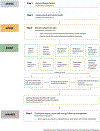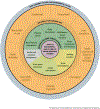Clinical guidelines for the use of lifestyle-based mental health care in major depressive disorder: World Federation of Societies for Biological Psychiatry (WFSBP) and Australasian Society of Lifestyle Medicine (ASLM) taskforce
- PMID: 36202135
- PMCID: PMC10972571
- DOI: 10.1080/15622975.2022.2112074
Clinical guidelines for the use of lifestyle-based mental health care in major depressive disorder: World Federation of Societies for Biological Psychiatry (WFSBP) and Australasian Society of Lifestyle Medicine (ASLM) taskforce
Abstract
Objectives: The primary objectives of these international guidelines were to provide a global audience of clinicians with (a) a series of evidence-based recommendations for the provision of lifestyle-based mental health care in clinical practice for adults with Major Depressive Disorder (MDD) and (b) a series of implementation considerations that may be applicable across a range of settings.
Methods: Recommendations and associated evidence-based gradings were based on a series of systematic literature searches of published research as well as the clinical expertise of taskforce members. The focus of the guidelines was eight lifestyle domains: physical activity and exercise, smoking cessation, work-directed interventions, mindfulness-based and stress management therapies, diet, sleep, loneliness and social support, and green space interaction. The following electronic bibliographic databases were searched for articles published prior to June 2020: PubMed, EMBASE, The Cochrane Library (Cochrane Database of Systematic Reviews, Cochrane Central Register of Controlled Trials (CENTRAL), Cochrane Methodology Register), CINAHL, PsycINFO. Evidence grading was based on the level of evidence specific to MDD and risk of bias, in accordance with the World Federation of Societies for Biological Psychiatry criteria.
Results: Nine recommendations were formed. The recommendations with the highest ratings to improve MDD were the use of physical activity and exercise, relaxation techniques, work-directed interventions, sleep, and mindfulness-based therapies (Grade 2). Interventions related to diet and green space were recommended, but with a lower strength of evidence (Grade 3). Recommendations regarding smoking cessation and loneliness and social support were based on expert opinion. Key implementation considerations included the need for input from allied health professionals and support networks to implement this type of approach, the importance of partnering such recommendations with behaviour change support, and the need to deliver interventions using a biopsychosocial-cultural framework.
Conclusions: Lifestyle-based interventions are recommended as a foundational component of mental health care in clinical practice for adults with Major Depressive Disorder, where other evidence-based therapies can be added or used in combination. The findings and recommendations of these guidelines support the need for further research to address existing gaps in efficacy and implementation research, especially for emerging lifestyle-based approaches (e.g. green space, loneliness and social support interventions) where data are limited. Further work is also needed to develop innovative approaches for delivery and models of care, and to support the training of health professionals regarding lifestyle-based mental health care.
Keywords: Major depressive disorder; guidelines; lifestyle; mental health; treatment.
Conflict of interest statement
Individual funding for each study author is included at the end of the manuscript. No funding body had any input into the design or conduct of the guidelines. Potential conflicts of interest for all taskforce members were compiled at the initiation of the guideline task- force and declared in the relevant section of this manuscript.
declarations and conflict of interest statement
All other authors declare no conflicts of interest.
Figures





Similar articles
-
The future of Cochrane Neonatal.Early Hum Dev. 2020 Nov;150:105191. doi: 10.1016/j.earlhumdev.2020.105191. Epub 2020 Sep 12. Early Hum Dev. 2020. PMID: 33036834
-
Clinician guidelines for the treatment of psychiatric disorders with nutraceuticals and phytoceuticals: The World Federation of Societies of Biological Psychiatry (WFSBP) and Canadian Network for Mood and Anxiety Treatments (CANMAT) Taskforce.World J Biol Psychiatry. 2022 Jul;23(6):424-455. doi: 10.1080/15622975.2021.2013041. Epub 2022 Mar 21. World J Biol Psychiatry. 2022. PMID: 35311615
-
Beyond the black stump: rapid reviews of health research issues affecting regional, rural and remote Australia.Med J Aust. 2020 Dec;213 Suppl 11:S3-S32.e1. doi: 10.5694/mja2.50881. Med J Aust. 2020. PMID: 33314144
-
Behavioural modification interventions for medically unexplained symptoms in primary care: systematic reviews and economic evaluation.Health Technol Assess. 2020 Sep;24(46):1-490. doi: 10.3310/hta24460. Health Technol Assess. 2020. PMID: 32975190 Free PMC article.
-
World Federation of Societies of Biological Psychiatry (WFSBP) Guidelines for Biological Treatment of Unipolar Depressive Disorders, Part 1: Acute and continuation treatment of major depressive disorder.World J Biol Psychiatry. 2002 Jan;3(1):5-43. doi: 10.3109/15622970209150599. World J Biol Psychiatry. 2002. PMID: 12479086 Review.
Cited by
-
Diet and depression.CMAJ. 2024 Oct 21;196(35):E1205-E1206. doi: 10.1503/cmaj.240440. CMAJ. 2024. PMID: 39433309 Free PMC article. No abstract available.
-
Alterations in gut microbiota caused by major depressive disorder or a low FODMAP diet and where they overlap.Front Nutr. 2024 Jan 8;10:1303405. doi: 10.3389/fnut.2023.1303405. eCollection 2023. Front Nutr. 2024. PMID: 38260072 Free PMC article. Review.
-
Improving mental health in black men through a 24-week community-based lifestyle change intervention: the black impact program.BMC Psychiatry. 2024 Jan 9;24(1):34. doi: 10.1186/s12888-023-05064-5. BMC Psychiatry. 2024. PMID: 38195473 Free PMC article.
-
Diet interventions for depression: Review and recommendations for practice.Aust N Z J Psychiatry. 2025 Feb;59(2):115-127. doi: 10.1177/00048674241289010. Epub 2024 Dec 4. Aust N Z J Psychiatry. 2025. PMID: 39628343 Free PMC article. Review.
-
Efficacy of a multimodal lifestyle intervention (The Lift Project) for improving the mental health of individuals with an affective mood disorder living in South Africa.Front Psychol. 2023 Jan 25;14:1127068. doi: 10.3389/fpsyg.2023.1127068. eCollection 2023. Front Psychol. 2023. PMID: 36760459 Free PMC article.
References
-
- Adevi AA, Mårtensson F. 2013. Stress rehabilitation through garden therapy: The garden as a place in the recovery from stress. Urban forestry & urban greening. 12(2):230–237.
-
- Aerts R, Honnay O, Van Nieuwenhuyse A. 2018. Biodiversity and human health: mechanisms and evidence of the positive health effects of diversity in nature and green spaces. British medical bulletin. 127(1):5–22. - PubMed
-
- Agency for Clinical Innovation. 2013. Understanding the process to develop a Model of Care in the ACI. NSW Health.
-
- Aikens JE, Rouse ME. 2005. Help-seeking for insomnia among adult patients in primary care. J Am Board Fam Pract. 18(4):257–261. - PubMed
Publication types
MeSH terms
Grants and funding
LinkOut - more resources
Full Text Sources
